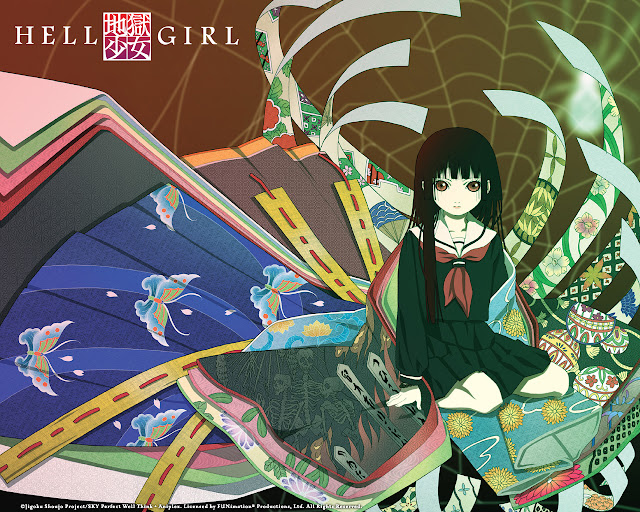Anata no urami harashimasu
Without a doubt, the most haunting and thought-provoking anime series I've ever watched is Jigoku Shoujo, which translates to English as Hell Girl.

Note that I do not say it's the best anime series I've ever watched, because it's often repetitive and depressing - but it sticks with me like no other show has. This summer, it's back for its fourth season after a nine-year layoff, and it hasn't missed a beat.
The premise is simple - There exists a mysterious, otherworldly website, which can only be accessed at midnight by someone bearing a strong hatred. On that site, you can enter the name of someone you want revenge against. At that point, you're whisked away to the Realm of Eternal Twilight, where you meet a girl named Enma Ai and her assistants. Ai has one of the assistants turn into a straw doll with a red string around it, which she then gives to you. If you untie the red string, the person whose name you entered will be taken directly to Hell. But there's a catch - whenever you eventually die, you'll be taken to Hell as well.
[I'm not quite clear on how "Hell" works in the show. Obviously they're not following the Christian rules, but both Shinto and Buddhism believe in reincarnation, so I'm not sure how someone can be cursed or condemned to "eternal pain and suffering."]
From there, the show takes more-or-less an anthology format, as Ai and her crew meet various people and almost always drag one of them off to Hell. There have been some running storylines throughout the show. One recurring character is a woman named Shibata Tsugumi. We saw her as a child in the first season and have seen her as an adult in seasons three and four. She's the descendant of the person who betrayed Ai and turned her into Hell Girl in the first place, and so she can sense Ai's presence and see who has contacted her. As a child, at first she thought it was good that Ai was getting revenge for people, but over the course of the first season she realized that people's hatreds aren't so clear-cut and simple. In later seasons, she's tried to talk people out of carrying out their revenge, but seems resigned to the fact that hatred will take its course.
And that, really, is my connection point with the show, the place where the story haunts me. How could you hate someone so much that you'd throw away your own soul? That's a question many of the characters ask themselves, and sometimes those questions and the answers they lead to can stick in your head. Not that I agree with them, but rather, like Tsugumi, I often find myself resigned to the inevitable forces of hate and resentment.
It's curious that the producers of Jigoku Shoujo chose this year to bring the show back. If they were Americans, I'd say they were taking the opportunity to comment on the state of the country. Jigoku Shoujo skipped over the entire Obama presidency, a time when FOX News and the Tea Party and Donald Trump stoked the fires of white resentment and White Rage, and gave us the landscape we have today. It's just a coincidence, of course. I'm sure whatever reasons the producers had hit much closer to home. But it's an uncanny one just the same.
Naturally, there are plenty of people who just watch Jigoku Shoujo to see the wacky punishments that get meted out when Ai's crew goes into action. And there are plenty of other people who are fans of Ai herself, in that creepy sort of way so many anime girls gather a fan following. But for me, the show goes deeper than that, often giving me a look into parts of the human condition that we'd rather not see, but that we ignore at our peril.

Note that I do not say it's the best anime series I've ever watched, because it's often repetitive and depressing - but it sticks with me like no other show has. This summer, it's back for its fourth season after a nine-year layoff, and it hasn't missed a beat.
The premise is simple - There exists a mysterious, otherworldly website, which can only be accessed at midnight by someone bearing a strong hatred. On that site, you can enter the name of someone you want revenge against. At that point, you're whisked away to the Realm of Eternal Twilight, where you meet a girl named Enma Ai and her assistants. Ai has one of the assistants turn into a straw doll with a red string around it, which she then gives to you. If you untie the red string, the person whose name you entered will be taken directly to Hell. But there's a catch - whenever you eventually die, you'll be taken to Hell as well.
[I'm not quite clear on how "Hell" works in the show. Obviously they're not following the Christian rules, but both Shinto and Buddhism believe in reincarnation, so I'm not sure how someone can be cursed or condemned to "eternal pain and suffering."]
From there, the show takes more-or-less an anthology format, as Ai and her crew meet various people and almost always drag one of them off to Hell. There have been some running storylines throughout the show. One recurring character is a woman named Shibata Tsugumi. We saw her as a child in the first season and have seen her as an adult in seasons three and four. She's the descendant of the person who betrayed Ai and turned her into Hell Girl in the first place, and so she can sense Ai's presence and see who has contacted her. As a child, at first she thought it was good that Ai was getting revenge for people, but over the course of the first season she realized that people's hatreds aren't so clear-cut and simple. In later seasons, she's tried to talk people out of carrying out their revenge, but seems resigned to the fact that hatred will take its course.
And that, really, is my connection point with the show, the place where the story haunts me. How could you hate someone so much that you'd throw away your own soul? That's a question many of the characters ask themselves, and sometimes those questions and the answers they lead to can stick in your head. Not that I agree with them, but rather, like Tsugumi, I often find myself resigned to the inevitable forces of hate and resentment.
It's curious that the producers of Jigoku Shoujo chose this year to bring the show back. If they were Americans, I'd say they were taking the opportunity to comment on the state of the country. Jigoku Shoujo skipped over the entire Obama presidency, a time when FOX News and the Tea Party and Donald Trump stoked the fires of white resentment and White Rage, and gave us the landscape we have today. It's just a coincidence, of course. I'm sure whatever reasons the producers had hit much closer to home. But it's an uncanny one just the same.
Naturally, there are plenty of people who just watch Jigoku Shoujo to see the wacky punishments that get meted out when Ai's crew goes into action. And there are plenty of other people who are fans of Ai herself, in that creepy sort of way so many anime girls gather a fan following. But for me, the show goes deeper than that, often giving me a look into parts of the human condition that we'd rather not see, but that we ignore at our peril.


Comments